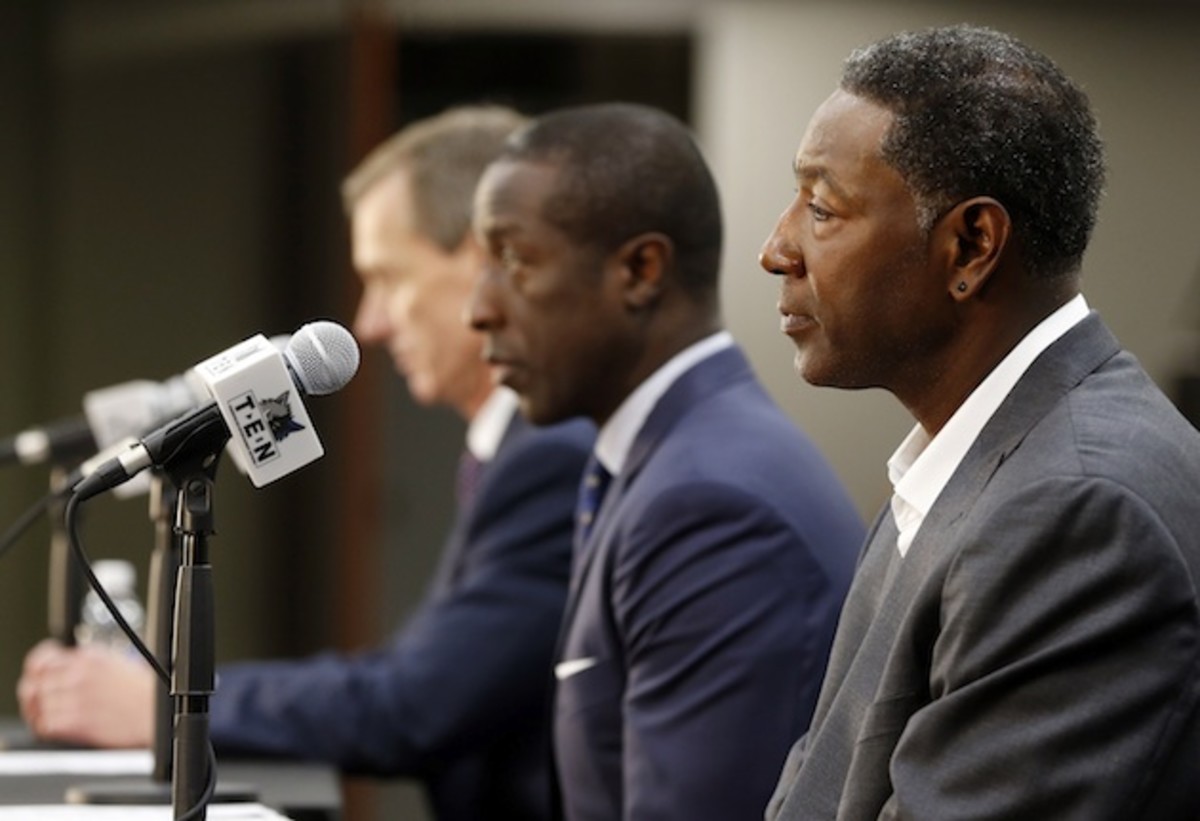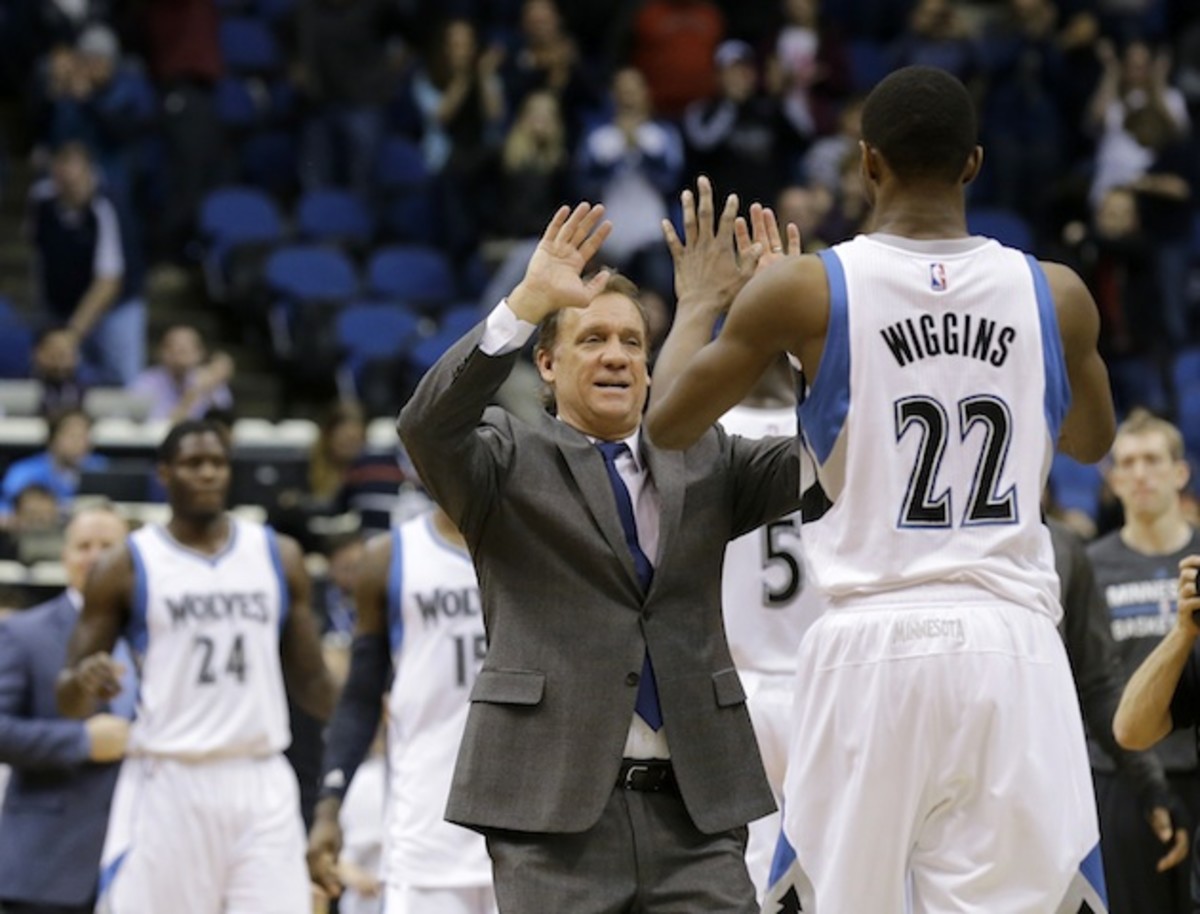Timberwolves' youth and upside belie their coach's harrowing fight

There’s Zach LaVine, air enough below to float a hawk, limbs bent like clay on its way to further tack beneath the flashbulbs.
There’s Andrew Wiggins, that specimen of latent rage, bolting down the floor in a blur of sinew, drawn by whatever basketball magnet levies the greatest gravity.
There’s Karl-Anthony Towns, sheer and wide and taut, deer’s eyes belying the hardwood wolf beneath—their youngest, possibly their best, certainly the piece that’ll make or break the puzzle.
And there’s Ricky Rubio, at 24 somehow the core’s elder statesman, his once anime-faced innocence chiseled to the time-gaunt grizzle of some happy hoops Quixote.
Around them bray 15,000 fans, all filed through the turnstiles to watch their beloved basketball team ... conduct an inter-squad scrimmage. In July. For a team that’s tallied 50 wins precisely four times in its 26-year history and routinely struggles to fill the seats, it was an unprecedented show of support.
What are they supporting? A new dawn of Timberwolves basketball? Yet another milk-and-honey mirage in the never-ending Exodus? That’s all anyone’s guess. Minnesota is no stranger to hard roster reboots, and if the current crop of talent can’t make headway, there’s no stopping Glen Taylor from selling the tower for couch change. Like he’s done so many adware woes before.
And yet, there’s a gestating sense that this year’s Wolves are somehow moored in something firmer. That for the first time in franchise history, the assembled talent, as raw and flawed and bad as its bound to be at times, actually makes sense. That the hope, the hype, the vast heaven-sent talent—it’s real, and deserving of fervor.
Andrew Wiggins might be Rudy Gay. He might also be an epoch-defining force. Zach LaVine might be a perennial All-Star. He might also be a better-looking Rex Chapman (somehow). Karl Towns might be what everyone thinks he’ll be. He might also be what everyone fears he could be. But the potential payoff for Wolves fans—the interest due on decades of exacted faith—has never been higher. And they intend to collect. Every last rage-dunked dime of it.
It’s unlikely Minnesota makes the playoffs. The West is just too good, and its stalwarts too entrenched, to risk so much as a preseason sleeper pick on a group whose median member would need a fake mustache just to rent a car. For these Wolves, “Next” may well be 10 runs down the line. But it’s the notion of “Next,” of there finally being skies beyond the Hell, that makes Minnesota such a raucous revelry vessel.
Forget basketball youth in revolt; these Wolves are basketball revolt in youth: still years away from realized aims, but imbued with the kind of verve, lust, and vivacity capable of raising cyclones in their wake. They’re young, hungry, and impossibly talented. They’re upside personified, hemmed by hope enough to bind even more deeply these forever Twin Cities.

While the Wolves plot their hoped-for hoops ascension, Flip Saunders fights for his life in a Minneapolis hospital. Diagnosed with Hodgkin’s Lymphoma on August 11, Saunders was forced to take an immediate leave of absence from his dual position as Minnesota’s head coach and team president. And while early reports hinted the disease had been caught early enough to warrant pulls for a speedy recovery, the Star Tribune’s Jerry Zgoda recently confided the tide may be turning against the longtime skipper:
There’s no question things have changed dramatically since the team announced his diagnosis in August, back when it quoted his doctors saying the cancer was very treatable and curable. Since then there have been changes to the way his body handled the chemotherapy (and maybe how much cancer they’ve found) that have made it life-threatening. Everyone involved has gone radio silent because of the family’s request for privacy and federal patient-privacy laws, etc., but between the complete silence, the lack of people visiting as far as I can tell apart from his immediate family and very inner circle while he remains hospitalized here in Minneapolis and the things I’m hearing second-hand, well, none of it is good.
Zgoda further speculates that, should Saunders somehow beat the cancer back, the tolls of yet another sideline siege would likely be too much to sweat. At 60 years old and with nearly a score of seasons beneath his trademark coif, Saunders has little left to prove. Certainly not to anyone—that is to say, a lion’s share of us—for whom “beating cancer” is an eminently nobler notch to belt than some die-cast toy of a trophy. If and when he works his way to health, to routine, to the lens of public life, that will surely be well and good enough. As it damn right should.
But that’s a black-hole-heavy “if,” and an even denser when. I submit I know nothing about Flip Saunders’ treatment, let alone his prognosis. But I know how it feels to have hope pulled from under you, from within and without and wherever you try and hide it. I’ve borne the pain of watching faith in progress you see wilt before the x-ray white of what you couldn’t. To catch it early and hit it hard, to trust the doctors and find the right treatment: I learned the language of no surrender, spoke it in a scholar’s tongue until I had scant words at all—until “go” became “let go,” and “good night” became “goodbye."
As someone who’s watched his child succumb to this scourge, there’s no more welcome a word than when a fellow human being smashes cancer. Because every life saved, prolonged, renewed or raised means a latch unlocked, a code broken, a hair of light where once traced the tunnel’s end. I want Flip Saunders to get better, to revel in the love I know we’d show him, and then go home to the family who fought beside him. And I want every cancer kid I meet to do the same, odds be damned, so I know Rett’s fight was waged that we might see his spirit’s peers win their own.
But I know a lot of them won’t. Cancer cares not for sentiments, let alone its victims’ innocence. Survivors are outliers, like seeds that fall through famine’s claws or willows that weather the flood: the plagues, they’ll be back again, and know which homes they’ve yet to pall.
It’s possible Flip finds the right chemo combination; that his doctors gain the upper hand and recovery becomes a viable outcome. With the right breaks, he may even make his way back to the bench, to coax his still puerile pups into a fang-bare frenzy, to watch as they pack upon the league like a carrion pile. We want this for Flip because we insist he deserves it. And maybe that heart-lined ace is in his cards. I only wish the deck were of a fairer stack, that the dealer cared to see beyond the ether-cold blindfold about his eyes.

It’s possible the Wolves find the right personnel combinations; that their front-office bosses fill the gaps and wins becomes a viable commonplace. With the right breaks, they may even make the playoffs. We want this for them because we insist they and their fans deserve it. Which is why, I think, these Wolves—both the players themselves and the embattled coach that is their totem—are a team for all. Yours and mine, to awe at and revel in as the yawp of youth they are.
For something so loud and fun should belong to everyone, like fireworks on the Fourth or the Whip/NaeNae literally anywhere. The Wolves are already on League Pass demand, and come next spring could well be on the hardwood household’s nightly dinner docket. We’ll talk about Andrew’s All-Star bid and Karl’s quiet dominance; about Zach’s latest drive-by clowning and Ricky’s yo-yo wizardry; about a basketball motherboard soldering itself into a terror at terabytes per second.
Regression, of course, remains very much in play—that constant counterweight to hope, beholden to nothing but what the whole’s parts were always programmed to be and do. The Wolves might lose, again and again, and keep losing until there are no more losses to count. They might not respond to the stimuli they’re given. All that outer pluck and vigor: it could quake, wide and at any single second, to disappear forever beneath itself. Because nothing, no matter how outwardly virile or vital, is immune to the sickness unseen.
Just ask Flip Saunders. Whether in spirit or patch or pregame ceremony, I hope these Wolves—and all of us who long to raise them as our own—find the time to heed and honor their coach’s fight. Not only for what he’s won or done or meant, to Minnesota and the league at large. But for what his struggles say about the fleeting nature of health, of youth, of life itself: That all the gifts you have, in the end, belong to fate, and that damn near alone.

